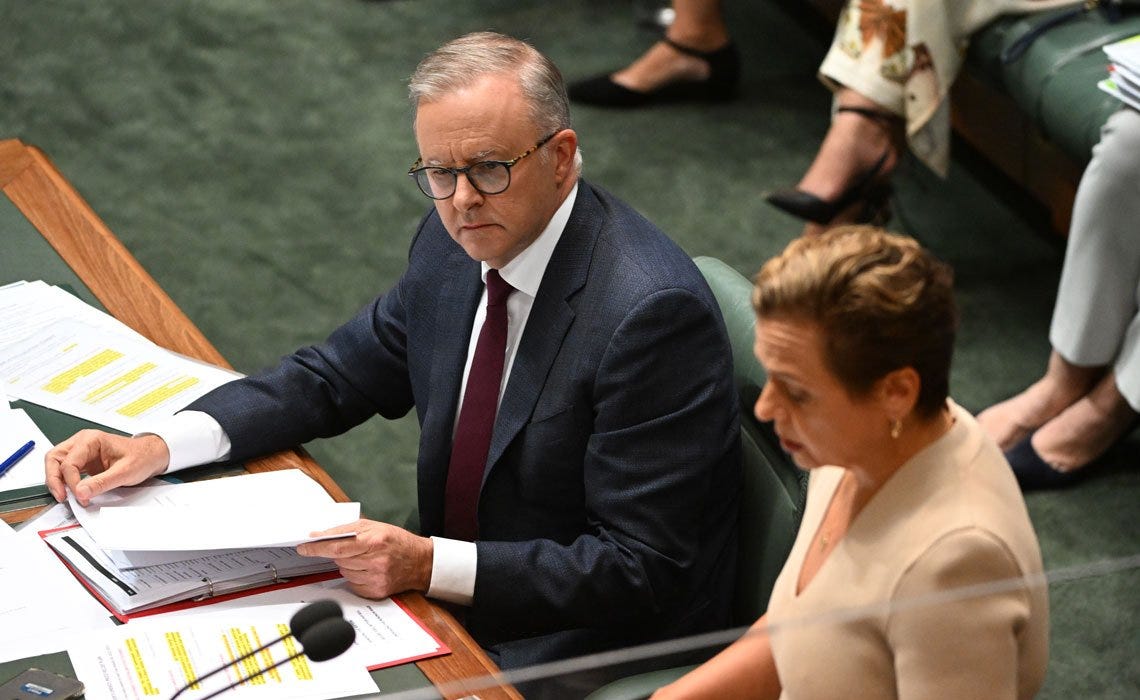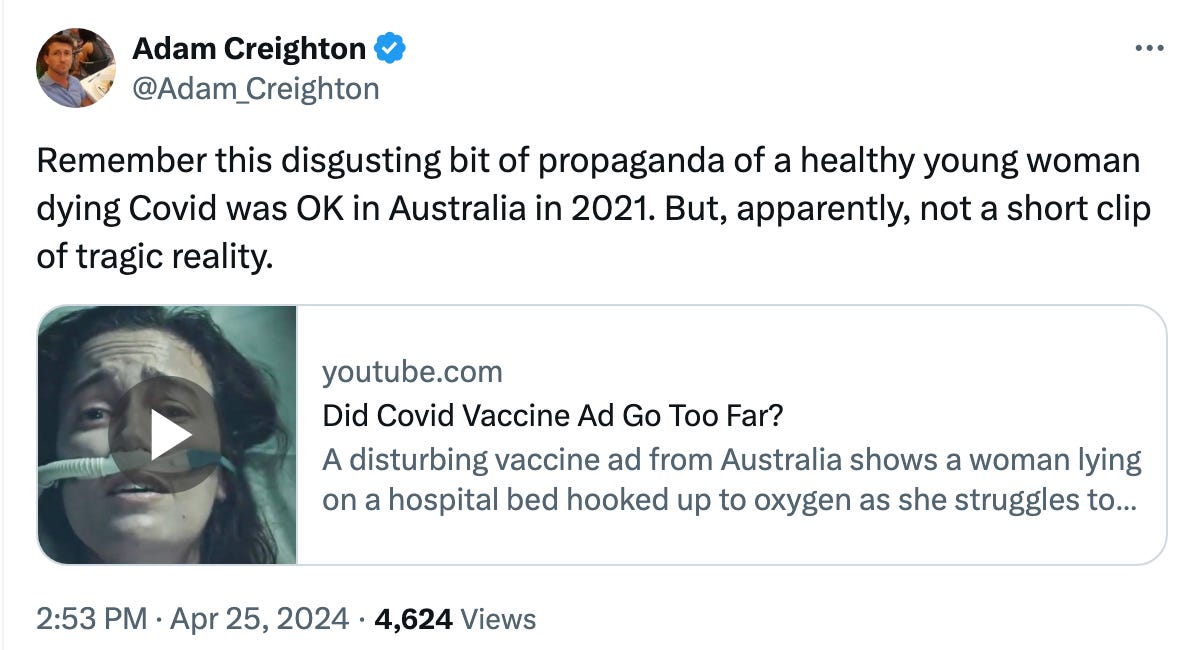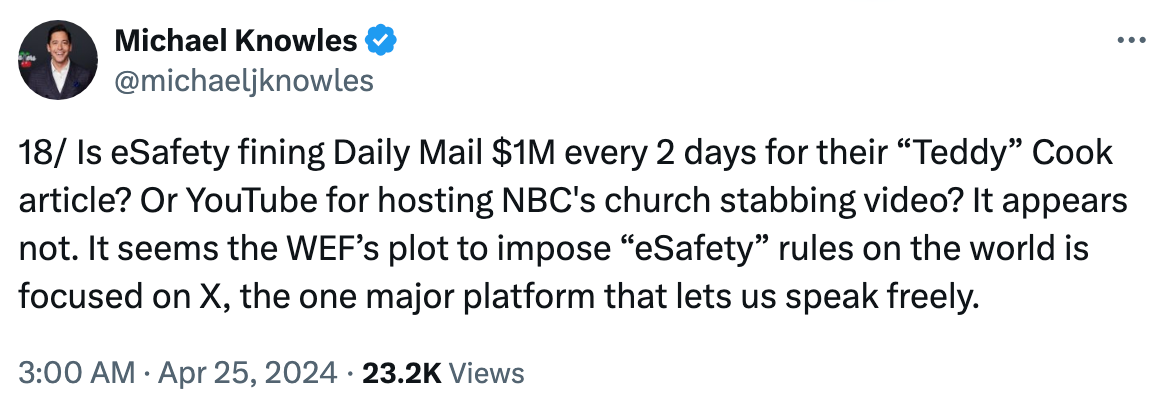Australian government hijacks knife attacks to push for misinformation laws
Never let a good emergency go to waste
Like Emily Blunt’s character in The Devil Wears Prada, who was ‘just one stomach flu away from goal weight,’ the Australian government was just one emergency away from manufacturing consent for its widely panned misinformation bill… until now.
In the wake of two violent stabbings in Sydney, one of which claimed six lives at a shopping mall, and the other of which was live-streamed during a church service, senior politicians and bureaucrats are promising to ramp up social media censorship to protect Australians from misinformation and violent content online.1
Two narrative threads dominating the media cycle underpin the renewed calls for censorship.
The main plot is a stand-off between Elon Musk’s platform X and Australia’s eSafety Commissioner, Julie Inman Grant over footage of the non-fatal church stabbing. The incident was classed as a terrorist incident by the New South Wales police, giving Inman Grant the legal power to order the footage removed from social media sites within Australia.
X says it has hidden the footage from Australians, but refuses to comply with a further demand to withhold the footage globally. Apparently the order for a global ban is to prevent Australians from using VPN technology to circumvent an Australia-only geo-block. eSafety says X isn’t doing enough to protect social media users from the violent content, and has obtained an injunction from the Federal Court to force X’s hand.
The subplot is the mis-naming of the Bondi Junction mall attacker, spread first on social media, then amplified with apparently zero attempt at verification by major news station Channel 7, with the wrongly named man now suing the station for defamation.
At a press conference on Monday, Prime Minister Anthony Albanese blamed social media companies entirely for spreading the damaging rumour, omitting mention of the corporate media’s role.
From these events, Australia’s top politicians and bureaucrats have drawn the following conclusions:
Inman Grant should be backed 100% in her attempts to censor content globally (says Deputy Opposition Leader Sussan Ley)
Social media platforms have a “social responsibility” protect Australians from content that might “cause division” (says Prime Minister Anthony Albanese)
Elon Musk is “totally out of touch with the values that Australian families have” and is causing Australians “great distress” (again, Albanese)
Social media companies are "pouring accelerant on the flames" of misinformation and extremism (says Australian Federal Police Commissioner Reece Kershaw)
In fact, social media is responsible for “just about every problem” in society, leaving governments to “pick up the pieces” (says Home Affairs Minister Clare O’Neil)
Therefore, the only responsible action for the government to take is to revamp its shelved misinformation bill in the hope of preventing “dangerous falsehoods” from spreading “at scale and speed” (says Communications Minister Michelle Rowland)
Indeed, our politicians are “prepared to take whatever action is necessary to haul these companies into line” (says Albanese)
Even the opposition party, which until now had vigorously opposed the misinformation bill, is now “happy to look at anything the government puts forward" because social media companies “see themselves [as] above the law” and we need to show them they’re not (says Liberal Party leader Peter Dutton)

Currently, the main way the Australian government controls the internet is under the remit of the eSafety Commissioner, who is empowered to minimise online harm. The Commissioner can order the removal of child abuse content, revenge porn, or a recently added category, ‘adult cyber abuse,’ which has resulted in the removal of gender-critical posts on social media. Read more about the eSafety Commissioner and her role in the global censorship network in my recent collaboration with Network Affects, here.
However, the government has little control over online content outside of eSafety’s remit. During the pandemic, the Department of Home Affairs and the Department of Health exploited the emergency to co-ordinate the removal of content on social media sites, including memes, true information, and vaccine injury testimony, but that gravy train has ended.
This year, the World Economic Forum (WEF) named mis- and disinformation as the world’s most pressing threat - more than more than war, more than hunger, more than poverty.
Governments are increasingly looking for ways to solve the problem that global elites have decided tops the list of all possible problems. In Australia, the solution put forward is a misinformation bill that would give the government new powers to set and enforce industry standards for digital platforms.
The issue is, the bill was deeply unpopular when it was floated for public consultation last year, attracting 23,000 comments, including 3,000 submissions. Many of the submissions were critical of the proposed laws, which would have the effect of censoring a staggering range of speech on issues from the weather, to elections, to public health, to gender ideology, and so on.
Notably, the government and mainstream media are exempt from the proposed laws.
Even the Human Rights Commission, which completely dropped the ball during Covid, claimed that the bill was a risk to democracy. Human Rights Commissioner, Lorraine Finlay said of the bill,
If we fail to ensure robust safeguards for freedom of expression online, then the measures taken to combat misinformation and disinformation could themselves risk undermining Australia’s democracy and freedoms.
An article I wrote for Umbrella News last year, titled, ‘Australia on ‘Dangerous Ground’: Is the New Misinformation Bill a Threat to Democracy?’ echoes Finlay’s concerns.
But flick through news coverage over the past fortnight and you’ll find that dissent over the bill is just a distant memory, because no one is safe until we’re all safe.
Corporate media are gleefully playing the story as Australia vs. Musk, throwing their full weight behind the government, while politicians and top bureaucrats are taking every talk-to-the-press opportunity to spruik the bill as a necessary measure to bring errant social media platforms to heel.
At the same time, in the parallel digital universe of X where Musk holds forth, people are wise to the government’s cynical ploy, and that far-right-wing-white-supremacist-nazi tactic of telling jokes is doing its work.
What kind of misinformation does the Prime Minister Albanese think social media companies have a responsibility to censor? Photoshopped memes of himself, a year-old video reveals.
The internet responded accordingly, spawning a tonne of new Albo meme threads overnight.
Ironically, the life-as-meme ridiculousness was foreshadowed by Senator Pauline Hanson, who reposted a July 2023 video from her cult Please Explain series, featuring a cartoon Albo trying to get the misinfo bill passed so that he can censor memes of himself. 15-year-old me could never have imagined that Senator Hanson would turn out to be Australia’s #1 troll, but here we are.
Less funny is the discussion taking place around glaring double standards in the way the Australian government goes about the business of censorship.
The Australian journalist Adam Creighton notes that propaganda scaring the public with fake virus death scenes is fine, but real news is not.

Independent journalist Maryanne Demasi points out that no one called for censorship of recently circulating footage of a man setting himself on fire in public, or of footage of George Floyd’s dying moments in 2020.
Left-wing Australian news site Crikey describes Elon Musk as a “vile piece of work with a penchant for extreme right-wing views,” but nevertheless called the corporate media, with its “if it bleeds it leads” modus operandi, “deeply hypocritical” for savaging Musk over his refusal to comply “with Inman Grant’s view that she should determine what anyone in the world can see online.”
And on the right, Daily Wire commentator Michael Knowles points out that mainstream media received no fines or take-down notices for publishing the news story featured in a post on X recently censored by eSafety … so is this regulatory pursuit of posts on X about the content, or is it about going after X?

Besides, it’s misleading to imply that the choice is ‘censorship or nothing,’ argues digital rights expert (and my recent collaborator) Andrew Lowenthal. Speaking with Demasi, he said, “I think there are non-censorship ways of addressing community concerns,” such as suggesting warning labels or disabling auto-play so viewers can decide whether to view the content or not.
In a comic narrative turn that could have been lifted from a Fawlty Towers script, the victim of the church stabbing, Bishop Mar Mari Emmanuel, has now declared that he disagrees with eSafety’s censorship of the footage of the attack on him, warning against the incident being co-opted for political gain.
In a statement posted to YouTube yesterday the Bishop, who is recovering in hospital, said,
“I do not condone any acts of terrorism or violence. However, noting our God-given right to freedom of speech and freedom of religion, I’m not opposed to the videos remaining on social media. I would be of great concern (sic) if people use the attack on me to serve their own political interests to control free speech.”
Nevertheless, Australia’s political class is unlikely to let this emergency go to waste. The eSafety Commissioner has the full-throated support of the government to continue her online censorship crusade, and the misinformation bill is currently being overhauled, to be tabled again later this year.
My sincere thoughts and prayers go to those who have suffered due to the knife attacks in Sydney this month.
Update 26 April 2024: In the latest news, Opposition leader Peter Dutton has tempered his support for unbridled censorship, telling 2GB radio that the government cannot be the “internet police of the world.” However, he maintains support for the eSafety Commissioner’s actions within Australia, and for working with the government to legislate the misinformation bill later this year. My guess is that his strong pro-censorship statements from earlier this week didn’t land well with his conservative base, and so he has softened messaging accordingly.
To support my work, share, subscribe, and/or make a one-off contribution to DDU via my Kofi account. Thanks!
A third stabbing on the same weekend resulting in the death of a Sydney teen has been omitted from the discourse around censorship, probably because it wasn’t filmed



I continue to interpret e-safety messages through the lens of ‘safe and effective’ saturation advertising over the last couple of years by governments, politicians and official agencies. It is now abundantly clear that these messages demonstrated misinformation and disinformation on a grand scale, and the level of hypocrisy of those same people attacking free speech is, well, breathtaking.
Re “Even the Human Rights Commission, which completely dropped the ball during Covid…”
How interesting to discover that someone associated with the World Economic Forum was the Australian Human Rights Commissioner during the key years of ‘Covid’ - Edward Santow who was Commissioner from 2016 to 2021.
According to his bio, Edward Santow was recognised as a Young Global Leader by the World Economic Forum in 2017.
Santow is a member of the World Economic Forum’s Global Future Council on Human Rights and the Fourth Industrial Revolution.
His areas of expertise include human rights, public law and discrimination law. He is a Fellow of the Australian Academy of Law, a Visiting Professorial Fellow at the University of New South Wales (UNSW), and serves on a number of boards and committees.
How many others associated with the World Economic Forum have infiltrated our institutions and parliaments?
Reference
https://humanrights.gov.au/about/commissioners/human-rights-commissioner-mr-edward-santow